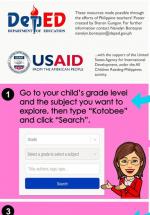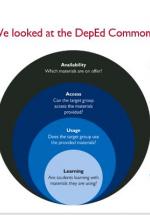Information and Communication Technologies
MEL Framework for Technology Supported Remote Teacher Training

This MEL Framework for Technology-Supported Remote Training seeks to help education program implementers, governments, and program evaluators more effectively design, implement, and learn lessons from remote training activities. It places special consideration on the unique characteristics of technology-supported interventions in the global South.
The framework presents minimum standards for the evaluation
of technology-supported remote training, which, in turn, facilitates the development of an actionable evidence base for replication and scale-up. Rather than “just another theoretical framework” developed from a purely academic angle, or a framework stemming from a one-off training effort, this framework is based on guiding questions and proposed indicators that have been carefully investigated, tested, and used in five RTI monitoring and research efforts across the global South: Kyrgyz Republic, Liberia, Malawi, the Philippines, and Uganda (Pouezevara et al. 2021). Furthermore, the framework has been reviewed for clarity, practicality, and relevance by several RTI project teams across Africa and Asia.
Accessing eResources on the DepEd Commons

This infographic describes how to find early literacy resources in multiple languages, which were developed by Philippine teachers with support from the USAID/All Children Reading activity in 2020-2021

DepEd Commons and dissemination of eResources: a SWOT analysis [Presentation]

This presentation was delivered at the 2021 mEducation Alliance Symposium in a panel on the subject of education technologies for basic education in the Philippines.

Governments' Organizational Responses to COVID-19 - Igniting Interest and Institutional Capacity in EdTech - Study Report

Led by the Basic Education Coalition (BEC), the Governments' Organizational Responses to COVID-19 - Igniting Interest and Institutional Capacity in EdTech study sought to understand what governments, specifically Ministries of Education (MoE), had to do organizationally to implement these programs, such as forging new partnerships, organizing and capacity building of personnel, developing or revising distance learning policies, and so on.
The information shared in this report stems from a global survey implemented across 12 countries in Asia, Africa, the Caribbean and South America with 23 responses from key MoE staff, including several department directors. In doing so, the study fills a knowledge gap for the international basic education sector and provides valuable insights to inform future education systems' capacity building programming. Insights and learnings surfaced from this study provide critical data on MoE capacity, technology investment, and other emerging structural shifts and strategies to support large-scale Education Technology (EdTech) programming and digital transformation of key activities.

Project Reconnect - Final Report

This is the final report for Project Reconnect, a bold and ambitious effort conceived by Google Germany, Google.org,
and NetHope in late 2015 that aimed to help refugees as they rebuild their lives in Germany by facilitating access to online education, language learning,
culture learning, and information resources.
This report was written by RTI International and based on data from 50 grantee organization reports, 320 Chromebook location managers, and 304 refugee
Chromebook users, highlighting achievements and lessons learned from the program.

School-based technology and the shift to remote learning during COVID-19: Exploring remote learning readiness of school districts in the Philippines

This research dives into the results of a 2019 survey of district ICT coordinators, school ICT coordinators and teachers in the Philippines, which collected information on the use of ICT in schools before the pandemic and school closures. The authors ask the questions: “How might the investment in school-based technology have prepared teachers to transition to various forms of remote, home-based teaching and learning?”, and “If experience with ICT in schools is assumed to be an asset in transitioning to remote learning, how many school districts in the Philippines were well-positioned when COVID-19 school closures hit.” Grounded in literature on remote learning readiness, the study authors selected questions from the original survey that could be considered assets in the rapid pivot to remote learning (e.g., skills, resources, policies, and plans).

Short Message Service (SMS)–Based Remote Support and Teacher Retention of Training Gains in Malawi
Chapter 5 of the book Cultivating Dynamic Educators: Case Studies in Teacher Behavior Change in Africa and Asia. This chapter critically reviews the design, implementation, and evaluation of an attempt to study an exploratory short message service (SMS)–based intervention conducted under the auspices of the United States Agency for International Development’s (USAID’s) Malawi Early Grade Reading Activity (EGRA).1 The overall EGRA program, which was implemented from July 2013 to October 2016 in 1,614 schools across 11 educational districts, was designed to support Malawi’s Ministry of Education, Science, and Technology (MOEST) to improve reading outcomes in both Chichewa.
and English languages among children in grades 1–3. The

eResources Review Toolkit

This toolkit was developed for the All Children Reading Philippines project to support Department of Education staff in developing and reviewing electronic resources for the DepEd Commons (online OER repository).

Teacher Coaching at National Scale: Insights into Using Technology and Data for Decision- Making in Kenya

This presentation summarizes qualitative data from user observations and semi-structured interviews with teachers and coaches, as well as Kenyan education officials on their use of Tangerine:Coach (previously Tangerine:Tutor) data for decision-making and teacher support. Tangerine:Coach is open-source software developed by RTI International that has been deployed in support of over 25,000 schools nationwide in Kenya since 2015, and is currently being introduced or scaled up also in Cambodia, Jordan, Liberia, Sierra Leone, West Bank, and Uganda.
In Kenya, a typical coach visit to a school includes taking stock of classroom conditions, observing teacher practice, appraising student ability, and providing pedagogical support to teachers. Tangerine:Coach is designed with the intent of supporting this process - the software applies logic to combine data from surveys, classroom observations, and student assessments into a feedback report tailored for each coaching conversation. Coaches regularly upload their data to a central server which are then published to an online dashboard and sent by email to education officials.
In theory, this data-sharing enables ongoing monitoring of coach activities and student progress and allows for timely targeted support (e.g., through additional school visits or professional development) to schools, teachers, or coaches as needed. Yet, how are these different actors actually using the data and dashboards? What changes are they making in their coaching or resource allocations? What data format is most accessible to actors across the different levels of the education system?
This prevention was developed by Lucy Wambari, Timothy Slade, and Carmen Strigel for the 2018 mEducation Alliance Symposium.
Mobile Learning and Numeracy: Filling gaps and expanding opportunities for early grade learning [Arabic]

The present study on Mobile Learning and Numeracy examines how mobile learning (m-learning) could influence and improve numeracy education at early grade levels (ages 4-10) especially in low-income
countries. Key questions to guide the research include: 1) What are the benefits and challenges of integrating mobile learning into early grade numeracy education? 2) What is the role of a teacher with
regard to mobile learning and numeracy education? 3) How can the community and the parents actively contribute to/participate in the child’s numeracy education with the use of mobile devices? and 4) How can mobile technology be used effectively in measuring/assessing numeracy gains?
The conclusions and recommendations of this study have been informed by an international working group that met over two days during the first International Numeracy Conference in Berlin in December 2012. We would like to acknowledge the following participants of this working group for their thoughtful contributions: Michaela Brinkhaus (BMZ); Dorothea Coppard (GIZ); Melanie Stilz (Konnektiv Büro für Bildung und Entwicklung); Jens von Roda-Pulkowski (KfW); Abigail Bucuvalas (Sesame Workshop); Mr. Kann Puthy (Primary Education Department, MoEYS Cambodia); Edward Barnett (DFID).

